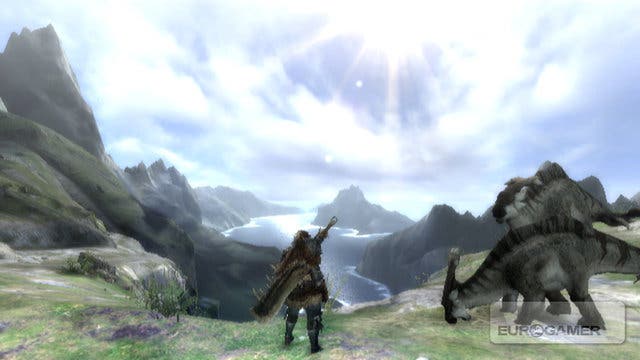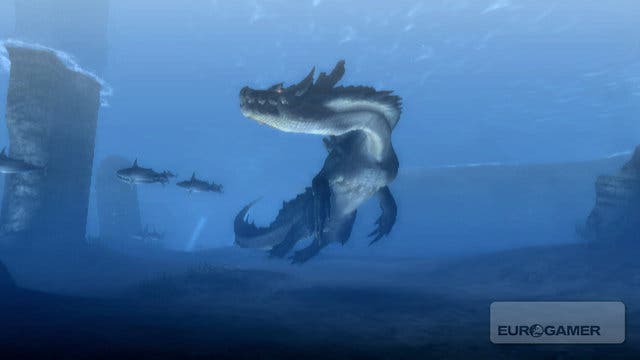Monster Hunter 3
Tri, tri again.
There are few games as hotly anticipated in Japan as Monster Hunter 3. On the PSP alone, Monster Hunter games have sold more than five million copies in the region. Everybody on the jam-packed trains is playing it, and bringing out a PSP instantly prompts strangers to invite you into matches (why else would you own one, after all?). Monster Hunter 3's stand on the TGS floor dwarfed those of most publishers, and was consistently jam-packed with eager members of the public willing to wait three to four hours for ten minutes in its company. It is a national obsession.
And yet, here in Europe, the Monster Hunter games have almost universally failed to catch on. Reviewers criticise its punishing difficulty and slightly broken controls, unable to invest the necessary tens of hours that it takes to start reaping the games' considerable rewards, struggling along without millions of other players to explain the game's quirks, help with tough missions and generally make things easier. Most of the people who play Monster Hunter in Japan are casual gamers, eased through the difficult first ten hours or so by a helpful friend, high-level relative or friendly train-stranger. We are without that advantage, and so only the most hardcore, patient, accommodating players ever tend to find out just how good Monster Hunter really is.
Monster Hunter's producer Ryozo Tsujimoto reckons that the absence of an active player community is the underlying reason for Monster Hunter's comparatively marginal popularity in the West. "In Japan, people will teach other people, and part of that is environmental factors - the fact that people live very close together, that they are always using transport. Part of it is just being able to learn from another person, teach another person, and that makes it a little bit easier on people who might otherwise find the game to be too hard to play... We've been trying very hard to develop this community. It's important to us that it grows, and that has contributed to the success of the series."

Will this game change the series' fortunes abroad? Well, because it's on the Wii, and because the engine has been reworked to make the game slightly more accessible, it just might, assuming it gets released in the West. Tsujimoto wants to hear from you if you that to happen. "Monster Hunter 3 is out in 2009 in Japan, but we're really hoping to make overseas versions," he claims. "Please send us your mail, send us your feedback - let us know that you want your game!"
Monster Hunter Tri, as it is known, is a reworking of the Monster Hunter concept from the ground up. It's got a new engine, new weapon and armour trees, new controls built specifically for the Wii. That said, it's still very much the game we already know and love. It's still going to take a lot of time, effort and skill before you're able to confidently stride into the unknown in search of a massive dragon rather than being punished by tiny raptors a few metres outside your campsite. But the process of getting to that stage of competency will be much more enjoyable this time around.

Tri's structure remains the same as Monster Hunter 2's. Working from a village base camp, you pick up hunting quests and head out into the big wide world in search of your bounty. Monster Hunter is as much about the thrill of the chase as it is about fighting monsters - tracking your prey, foraging for helpful items and ingredients, observing a monster's behaviour from afar before even attempting to attack it, then embarking upon an epic, sometimes hours-long battle with it. Tri is set on a beautiful island paradise, with all the verdant jungles, atmospheric caves and tranquil beaches that such an environment entails. It is an exceptionally good-looking Wii game, even if most of the animation is recognisable from the PS2 version of Monster Hunter 2.


